|
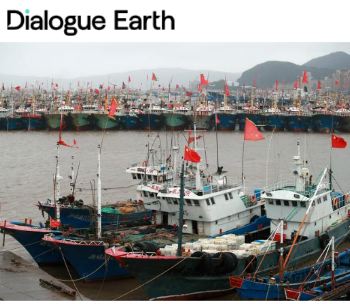
Photo: Stockfile /FIS
China's Fisheries Law Overhaul Aims for Greater Sustainability
 CHINA
CHINA
Monday, March 17, 2025, 02:00 (GMT + 9)
Nearly 16 million people in China depend on fisheries production for their livelihoods. A significant overhaul of the law governing their work, unveiled in December 2024, could impact all of them.
 China’s current fisheries law came into force in 1986, reports Regina Lam from Dialogue Earth. The amendments proposed last year are the most extensive since 2000, Zhang Yanxuedan, an associate professor at Shanghai Ocean University’s College of Marine Culture and Law, told Dialogue Earth. China’s current fisheries law came into force in 1986, reports Regina Lam from Dialogue Earth. The amendments proposed last year are the most extensive since 2000, Zhang Yanxuedan, an associate professor at Shanghai Ocean University’s College of Marine Culture and Law, told Dialogue Earth.
That revision 25 years ago introduced a system of management based on total allowable catch and has had three minor updates in subsequent years.
In contrast, the latest proposals would amend 48 of the 50 existing articles, add 32 new articles, and include a new chapter on fisheries supervision and management. This reform, in preparation for a decade, says Zhang, is anticipated to pass this year.
 The revision strongly emphasizes sustainability and conservation, a move welcomed by many in environmental circles. Wang Songlin, president of the Qingdao Marine Conservation Society, states, “Generally, I feel like this version of the fisheries law has more emphasis on sustainable development and green development.” The revision strongly emphasizes sustainability and conservation, a move welcomed by many in environmental circles. Wang Songlin, president of the Qingdao Marine Conservation Society, states, “Generally, I feel like this version of the fisheries law has more emphasis on sustainable development and green development.”
Others advocate for stronger protections for fishers’ livelihoods, as the legislation could alter many existing harvesting practices.
Here's what you need to know about the upcoming changes.
Tracking Food from Net to Plate
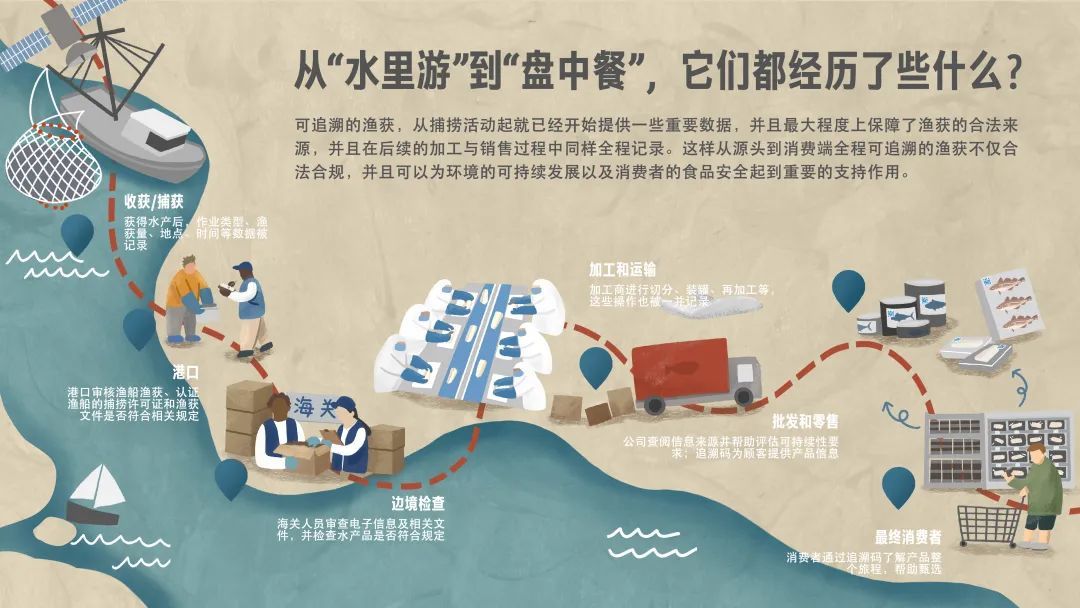
Traceable seafood supply chain: Environmental sustainability and food safety
Traceability management, which involves logging and sharing data about fish from catch to sale, can help curb illegal fishing and overfishing. A new article in the draft “encourages fishing vessels to berth and unload their catch at designated ports and implement traceability management of catch.”
 Huang Shan, an ocean campaigner at Greenpeace East Asia, points out that "encourages" differs from "mandates." She notes that a 2019 draft of the reform included more specific measures, such as product labeling with information on the vessel’s name and number, fishing license, fishing area, and gear used. “But they were all deleted in this version,” she adds. Huang Shan, an ocean campaigner at Greenpeace East Asia, points out that "encourages" differs from "mandates." She notes that a 2019 draft of the reform included more specific measures, such as product labeling with information on the vessel’s name and number, fishing license, fishing area, and gear used. “But they were all deleted in this version,” she adds.
Zhang, involved in drafting the law, says the “encouragement” reflects the government’s commitment to improving traceability, so that the origins of all major catches will gradually become traceable. "This will further curb illegal, unreported, and unregulated (IUU) fishing and enhance the quality and safety of aquatic products", she adds.
However, the large number of fishing boats in China makes implementation challenging. The country has nearly 500,000 vessels, including 46,000 large and medium-sized ones, according to official data. Ensuring compliance will strain ports, and authorities will need time to develop enforcement capacity.
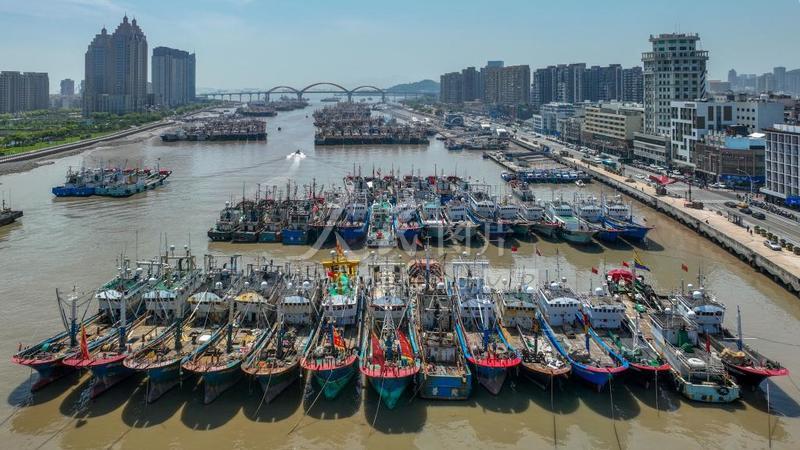
Zhoushan city fishing vessels
The draft law also proposes granting ports the authority to inspect foreign vessels and deny entry to those suspected of IUU fishing.
 Zhou Wei, head of the oceans program at Greenpeace East Asia, says this indicates China’s willingness to align with the Port State Measures Agreement to combat IUU fishing by preventing non-compliant vessels from landing catches. The PSMA is a key international agreement under the UN’s Food and Agriculture Organization, which China has for some years expressed interest in joining, most recently in a 2023 white paper. Zhou Wei, head of the oceans program at Greenpeace East Asia, says this indicates China’s willingness to align with the Port State Measures Agreement to combat IUU fishing by preventing non-compliant vessels from landing catches. The PSMA is a key international agreement under the UN’s Food and Agriculture Organization, which China has for some years expressed interest in joining, most recently in a 2023 white paper.
Tackling Unregistered Boats
China has a large number of fishing boats lacking official names, numbers, certification, and homeport registration. These "three noes" vessels are often involved in illegal activities, such as fishing during moratoriums.
The government has been cracking down on unregistered boats since the 1990s, but they remain a problem. Past crackdowns have largely relied on regulations and notices from the State Council, which lack the legal force and specific rules of law, notes Zhang of Shanghai Ocean University. “The current legal basis for cracking down on unregistered boats fishing is feeble,” she says.
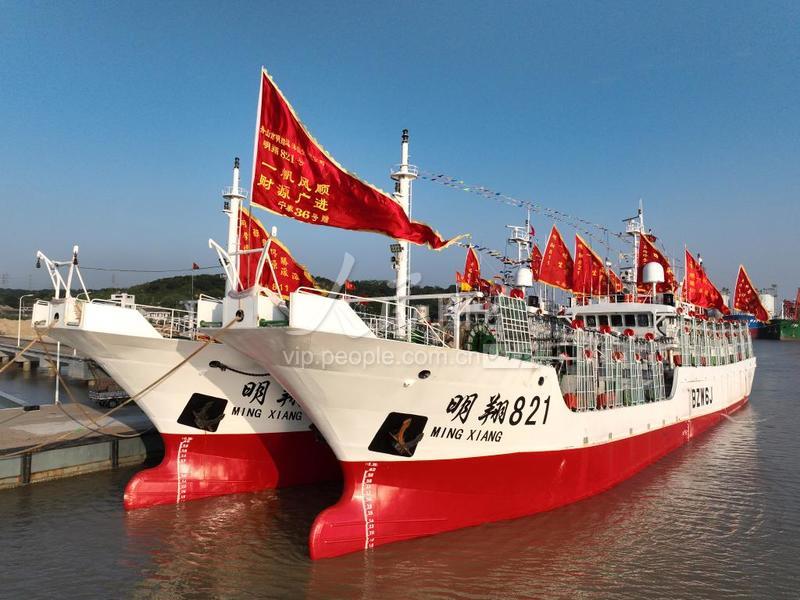
Modern squid fishing vessels are being built to operate in distant waters.
A proposed article in the draft would ban unregistered boats from fishing and prohibit supplying them with fuel, water, and ice to preserve catches without verifying their registration.
"This significantly strengthens enforcement", Zhang says.
Curbing Unsustainable Practices
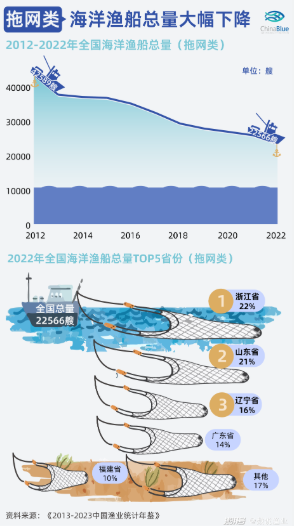 Decades of overfishing have pushed many of China’s coastal fish stocks to near collapse. The government has responded by reducing fleet sizes and cracking down on unregistered vessels and harmful fishing gear. Experts told Dialogue Earth that the proposed revision consolidates these measures and strengthens their enforcement. Decades of overfishing have pushed many of China’s coastal fish stocks to near collapse. The government has responded by reducing fleet sizes and cracking down on unregistered vessels and harmful fishing gear. Experts told Dialogue Earth that the proposed revision consolidates these measures and strengthens their enforcement.
In 2009, the Ministry of Agriculture categorized fishing gear into three groups: permitted, prohibited, and transitional. The latter category meant the government would eventually decide whether to ban or permit the gear, based on conservation needs. This categorization aimed to create a directory of marine fishing gear, but it was not published or adopted.
In 2014, the government officially prohibited 13 types of gear, including trawls and rakes that can damage the seabed. It also set minimum mesh sizes on some gear to prevent catching smaller, younger fish, allowing populations to recover.
However, fishers continuously invent new designs or slightly modify existing equipment, rendering a blacklist system inadequate.
The revised fisheries law would shift towards a directory of permitted gear, listing authorized types, standards, and functions. Producing, selling, and using any other gear would be banned.
Huang of Greenpeace East Asia says the permitted-list approach is “more comprehensive and effective” for managing fishing gear and enforcing rules.
“It is a positive sign that [the directory] was finally written in the fisheries law,” says Huang. “We look forward to seeing specific implementation guides following the legislation.”
Balancing Resource Protection and Fishers’ Livelihoods
While targeting unregistered boats and damaging gear could curb overfishing, it might also harm the livelihoods of people with limited alternative employment options.
 “The dilemma facing our offshore fishery in China is that, while there are too few fish in the sea, we have an enormous group of subsistence fishers who fish for a living,” says Tong Yuhe, a lecturer at Hainan Tropical Ocean University. “The dilemma facing our offshore fishery in China is that, while there are too few fish in the sea, we have an enormous group of subsistence fishers who fish for a living,” says Tong Yuhe, a lecturer at Hainan Tropical Ocean University.
Witnessing fish in nets getting smaller in size and age, many fishers had no choice but to use unlawful gear and chase mostly small fish for a living, he adds. In addition to requiring the phasing out of unsustainable gear and practices, Tong suggests the legislation should provide support for fishers to find alternative employment.
“You can’t handle the problem only by cracking down. After the crackdowns, you must offer them opportunities to make their way in another industry,” he says.
One possibility could be recreational fishing trips for tourists. However, fishers have been reluctant to invest in this due to a lack of clarity over its legality. The draft law does not directly address this, but states that “provinces, autonomous regions and municipalities should establish their recreational fishing management measures.”
Some experts advocate for a national standard defining recreational fishing boats and gear, both to encourage development and prevent commercial fishing disguised as recreational fishing.
Improving Aquaculture
Besides capture fisheries management, the legislation also updates aquaculture law. It promotes "energy-saving" and "environmentally friendly" forms of the industry and encourages "ecological value-added" fish farming.
Wang, of the Qingdao Marine Conservation Society, welcomes the emphasis on greener aquaculture. “This [proposed] article is great. It is a guiding principle that aligns with sustainability.”
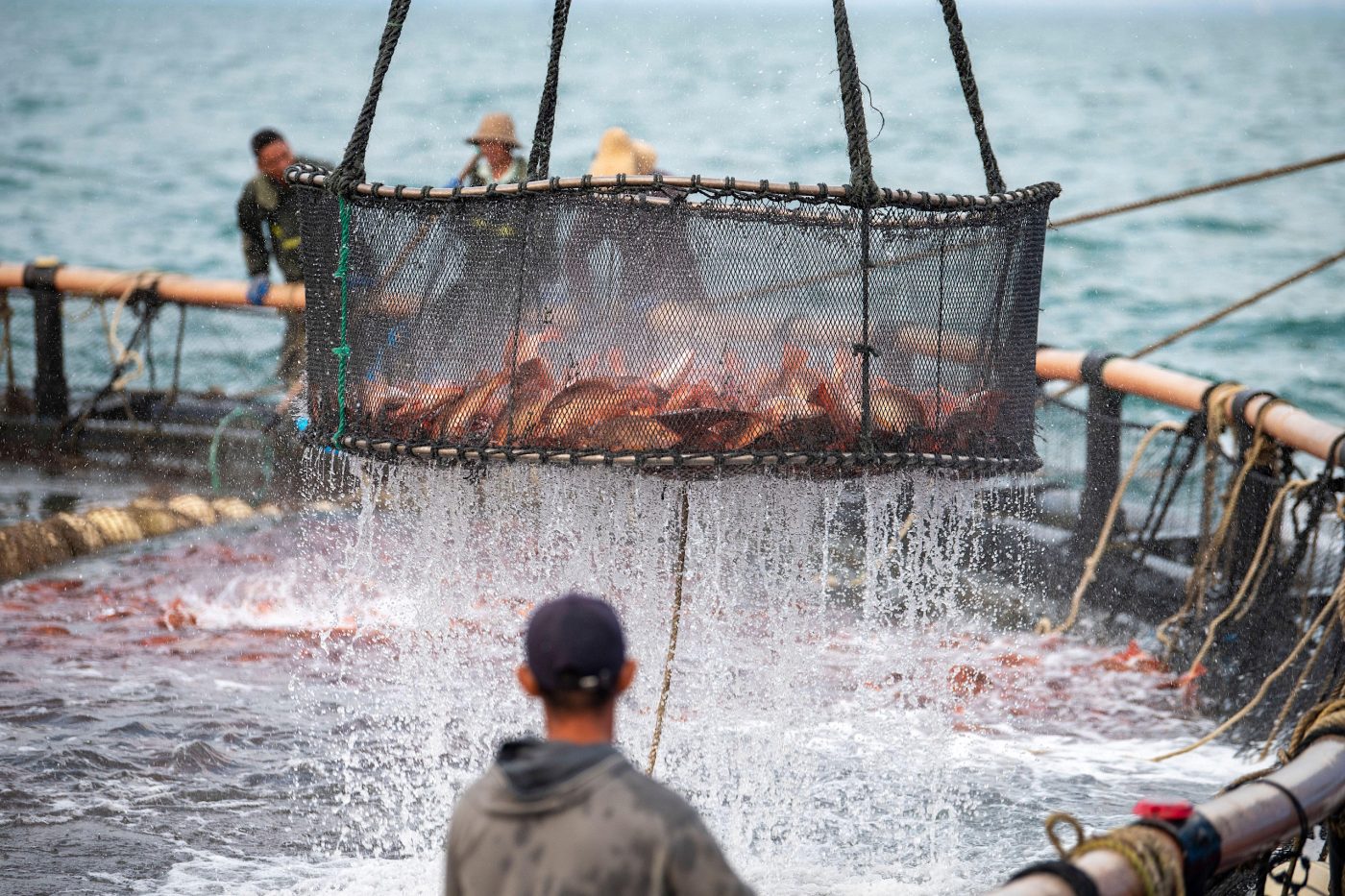
Fishers raise crimson snapper from an aquaculture cage in Beihai, Guangxi province (Image: Zhai Liqiang / China News Service / Alamy)
He suggests that once the proposed law is legislated, there should be more detailed guidelines and efforts to encourage consumer behavior towards purchasing aquatic products fed with greener feed.
He also suggests a ban on using wild-caught juvenile shrimp, crab, and mollusks as food for farmed animals, as sourcing these can threaten wild populations. Using plant-based ingredients, insects, or algae could reduce pressure on marine ecosystems.
Wang also hopes the revised law will include more stringent rules on drug use and wastewater discharge to limit impacts on aquatic environments and biodiversity.
The Journey to a New Fisheries Law
It took over a decade of work from experts and legislators for the revised draft to reach the state legislative body, the National People’s Congress (NPC).
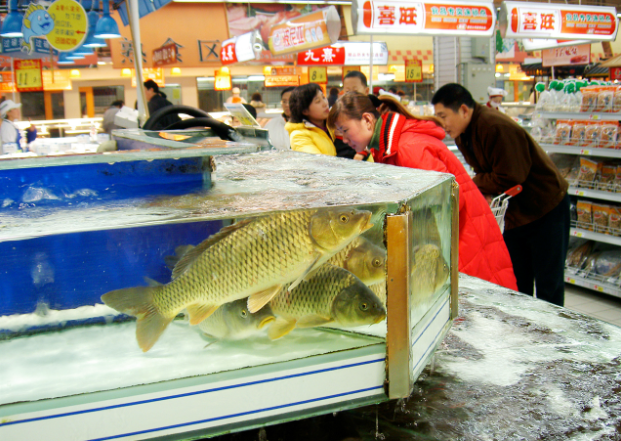
Customers select fish from tanks in a supermarket in Jinan, Shandong province. Through the new law, the government is seeking to improve traceability of fish, from point of catch to point of sale (Image: David Lyons / Alamy)
It is now with the NPC’s standing committee, its permanent body, for review, and was open for public consultation until January 23. The standing committee typically reviews a bill two or three times before passing it.
Experts involved in and observing the process told Dialogue Earth that significant efforts were made to coordinate with and gather feedback from across government and stakeholders.
Zhang notes that the fisheries law regulates the industry and its sustainable use and protection of natural resources, but it must also protect fishers.
“These three aspects involve different regulatory demands. Coordinating and balancing these different interests, while fulfilling the aims of the legislation, is a challenge in revising the law,” she says. “Pushing for such significant legislation amendment is not easy.”
editorial@seafood.media
www.seafood.media
|



